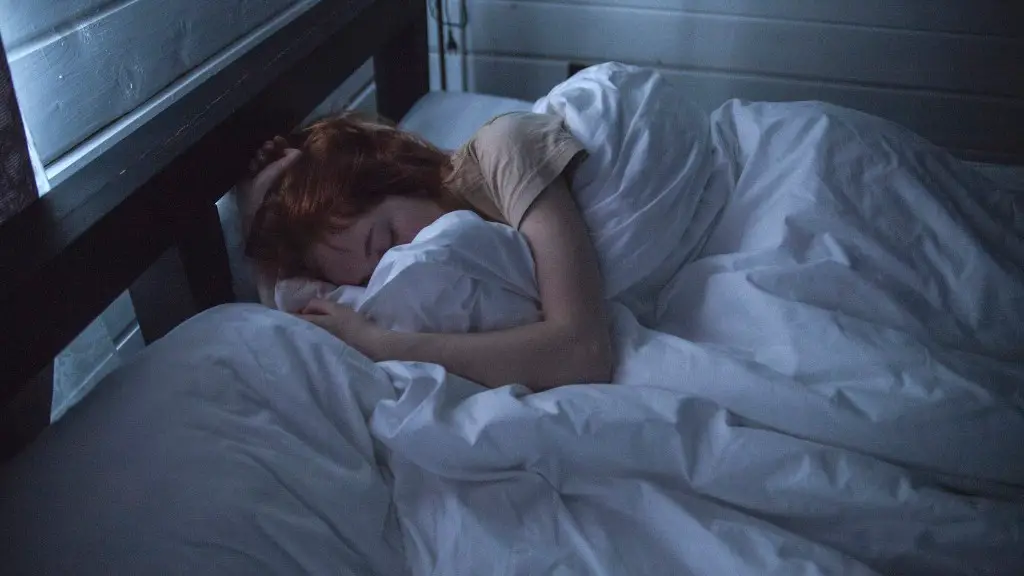There are a lot of possible reasons why someone might be having more bad dreams than usual. It could be a sign that something is stressing them out in their life, or it could be a side effect of medication. It’s also possible that the person is going through a particularly tough time in their life, or that they’ve recently experienced a traumatic event.
There could be a number of reasons why you are having bad dreams. It could be that you are under a lot of stress in your waking life and your subconscious is working through those issues in your dreams. It could also be that you are not getting enough restful sleep and your dreams are reflecting that. Alternatively, it could be that you are watching too much television or spending too much time on the computer before bed, which can lead to more lively dreams. Whatever the reason, try to get to the root of it so that you can get some relief.
What causes multiple bad dreams every night?
There are a number of psychological triggers that can cause nightmares in adults. For example, anxiety and depression can cause adult nightmares. Post-traumatic stress disorder (PTSD) also commonly causes people to experience chronic, recurrent nightmares. Additionally, certain sleep disorders can also be a cause of nightmares in adults.
If you’re having bad dreams on a regular basis, it could be a sign of an underlying health condition. An estimated 2% to 8% of adults experience regular nightmares that impact their sleep. If you’re having trouble sleeping due to bad dreams, talk to your doctor to see if there’s an underlying cause.
What are nightmares trying to tell you
There is a lot of research that suggests that nightmares are often linked to unmet psychological needs or frustration with life experiences. However, it can be difficult to make those links in many cases, as nightmares often reflect our troubles through metaphor rather than literal representation. This is especially true in cases of trauma, where our nightmares may be more literal representations of our experiences.
If you or your child are having nightmares, there are some things you can do to help. Establishing a regular, relaxing routine before bedtime can be helpful. Having a consistent bedtime routine is important. Offering reassurances and talking about the dream can also be helpful. Rewriting the ending and providing comfort measures can also be helpful. Using a night light can also help.
Are nightmares bad for your heart?
Frequent and severe nightmares may be associated with heart problems, high blood pressure, and heart attack after adjusting for age, sex and race. If you experience frequent and severe nightmares, you should talk to your doctor to rule out any underlying health conditions.
It’s interesting to note that the two most frequently reported nightmares are falling and being chased. More than 50% of survey respondents also reported frequently having nightmares about death, feeling lost, and feeling trapped. This just goes to show that there are a variety of different things that can cause someone to have a nightmare. It’s important to try to understand what might be causing your nightmares so that you can try to address the issue and hopefully stop having them.
Are bad dreams a symptom?
Most people have experienced a nightmare at some point in their lives. For some, nightmares may be a regular occurrence, while for others, they may be infrequent. Nightmares seem to be a part of normal development, and except in the case of post-traumatic stress disorder (PTSD), they usually aren’t symptoms of any underlying medical condition or mental disorder. However, nightmares can become a problem if they persist and interrupt your sleep pattern. If you’re regularly having nightmares, it’s important to identify any possible underlying causes, such as stress or anxiety, and address them. There are also some simple things you can do to help reduce the frequency and severity of your nightmares.
There is a strong link between physical and mental health and the quality of our dreams. Conditions like stress and anxiety can cause vivid dreams, as can mental health conditions like depression and schizophrenia. Physical illnesses like heart disease and cancer have also been associated with vivid dreams.
When should I be worried about nightmares
If you are frequently experiencing nightmares that are causing you major distress, anxiety around sleeping, fatigue, and problems concentrating during the day, you may have nightmare disorder. This is a condition where your bad dreams are happening often or severely enough to affect your life. If you think you may have this disorder, please talk to a doctor or mental health professional to get help.
Nightmares, dreams, and other sleep disturbances are a common symptom of complex trauma. Nightmares are recognized as a principal feature of post-traumatic stress disorder (PTSD). The treatment of nightmares not only alleviates those symptoms but is shown to help reduce PTSD symptoms in general.
When you remember a dream What does it mean?
If you remember your dream, it doesn’t necessarily mean that the dream was significant. It could just mean that you woke up during it, so it’s still fresh in your mind. Alternatively, it could mean that you’re only remembering the very last dream you had, rather than the dream in its entirety. If you’re concerned about the meaning of your dreams, it’s best to discuss them with a sleep specialist or other healthcare professional.
Nightmare disorder is a sleep disorder that is characterized by frequent nightmares. The nightmares typically portray the individual in a situation that is potentially life threatening or could cause them personal harm. The nightmares often occur during the REM stages of sleep.
What illnesses cause night terrors
Sleep terrors are a type of sleep disorder that can be caused by underlying conditions that interfere with sleep. Common underlying conditions include sleep-disordered breathing and restless legs syndrome. Some medications can also contribute to sleep terrors.
Melatonin is a hormone that helps regulate sleep andwakefulness. It is mainly produced in the body during the nighttime, and it provides individuals with a sense of drowsiness and relaxation. Some people take melatonin supplements in order to help them fall asleep or stay asleep. Although melatonin is generally considered safe, there are some reports that it can cause bizarre dreams and nightmares. If you are considering taking melatonin supplements, you should speak with your healthcare provider to discuss the potential risks and benefits.
Why do bad dreams wake you up?
The hypnagogic state is a normal part of falling asleep. It happens as you begin to drift off and your brain is in a semi-awake/semi-asleep state. Part of it is still in rapid eye movement, or REM, sleep—the deep stage of sleep where our brain is more active, allowing for intense dreams. As you begin to rouse, the dream-like imagery of REM sleep intrudes into your waking state.
This can be a normal and healthy part of the sleep process. However, if you’re regularly experiencing hypnagogic hallucinations, it could be a sign of sleep deprivation or a sleep disorder. If you’re concerned about your symptoms, talk to your doctor.
Nightmares can be extremely unsettling and often leave us feeling scared or even traumatized. However, did you know that some nightmares actually have hidden meanings? Here are 10 common nightmares and what they might mean:
1. Teeth falling out: Dreams about your teeth falling out can reflect your anxieties about your appearance and how others perceive you.
2. Being chased: Dreams about being chased often represent something that we are avoiding or running away from in our waking lives. It could be an issue or problem that we are trying to avoid, or it could be an emotion or feeling that we are trying to suppress.
3. Unable to find a toilet: Dreams about not being able to find a toilet usually symbolize feelings of anxiety or insecurity. This could be in regards to a specific situation or life in general.
4. Naked in public: Dreams about being naked in public usually signify feelings of vulnerability or insecurity. This could be in regards to a specific situation or life in general.
5. Unprepared for an exam: Dreams about being unprepared for an exam often reflect our anxieties and fears about real-life tests or challenges.
6. Flying: Dreams about flying often represent our desire for freedom or escape.
Final Words
There is no one-size-fits-all answer to this question, as the reasons for having bad dreams can vary from person to person. However, some possible reasons for why you may be having more bad dreams than usual could include stress, anxiety, or changes in your sleeping habits. If you’re concerned about the frequency of your bad dreams, it may be worth talking to a mental health professional to explore possible causes and treatments.
There could be a number of reasons why someone might be having bad dreams. It could be something as simple as stress or anxiety, or it could be something more serious like a sleep disorder. If the bad dreams are causing distress or interfering with daily life, it might be worth talking to a doctor or mental health professional to get to the bottom of it.





